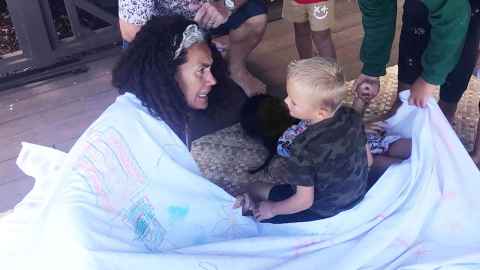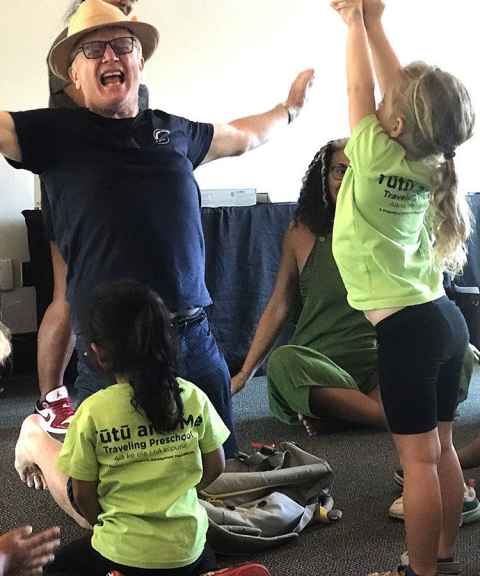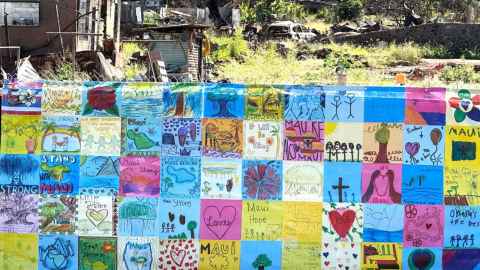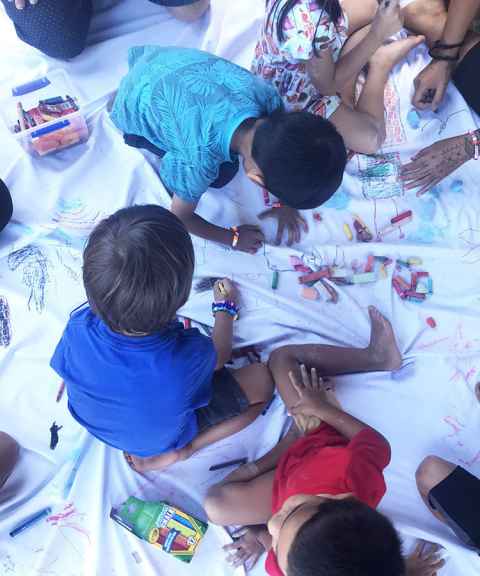Dreams and rainbows were all part of the magic as a team from the University of Auckland offered creative support to children affected by last year's devastating fires on Maui.

Known for its expertise in engaging with children after disasters, the Centre for Arts and Social Transformation (CAST) at the University of Auckland was approached by the Maui Arts and Cultural Center (MACC) in Kahului for support as they worked with residents of the devastating fires last year.
This culminated in an invitation for centre co-directors, Professors Peter O'Connor and Selina Tusitala Marsh, centre manager Amanda Wallace and research assistant Emily Gibson to visit Maui in April to lead art-based activities with local children and their families who'd been directly affected by the Lahaina fires.
The fires killed 101 people and caused widespread destruction, leaving many homeless.
The team were also keen to work with Maui arts practitioners on creating resources for educators rooted in Hawaiian culture that will soon be found on the centre's Te Rito Toi website and freely available, says Gibson.
"We were there to share our knowledge about arts-based activities for children that help process trauma in post-disaster contexts, as well as piloting some new activities.
"And from the moment we landed, the folks at MACC hugged and kissed us and said, 'You're part of the family.' I've visited communities all over the place, and I don't think I've ever been so warmly and genuinely welcomed."

During an action-packed ten days, applied theatre expert Peter O'Connor and poet Selina Tusitala Marsh both led successful activities, including a poetry workshop and book session, and an applied theatre activity for three and four-year-olds.
"I told the children my job was to put the rainbow I was carrying into the sky," says O'Connor, "and when I went to show them the rainbow it had gone, and the bag was empty.
"We'd hidden large, coloured cloths outside the centre we were working in, and after riding outside on a magic carpet, they helped me 'find my missing rainbow' which everyone - an assortment of mums, dads, grandparents and kids - helped me sew back together with coloured ribbons."
He says the children loved helping 'the man who had lost the rainbow' and talking about how hard it is when you lose things you treasure.
An extension of this activity involved everyone hiding under the big, sewn-together rainbow, then carrying it inside and talking about how to care for precious things.
"Each child chose a small piece of the rainbow to remind them of what they'd done, and that evening at the beach, we saw the most gorgeous rainbow. A three-year-old also saw it and said to her mum, who worked at the centre, "Look, we helped uncle Peter put the rainbow back in the sky."

Many local people in Lahaina who lost their homes have been sheltering in hotels and resorts and obviously not living as tourists would, but often living alongside them in an uncomfortable "clash of worlds," says Gibson.
"The fire caused a significant rupture to people's everyday routines, to the extent of them not knowing how they would cook for their families, as well as not being able to fulfil their wider family and community roles. Because of this, I was told mental health is an increasing challenge for those still in temporary accommodation."
Hence a morning of activities with people in this situation, organised by Maui Arts Centre who have been working there since the fires last year.
One such activity, 'A Teaspoon of Light', devised by O'Connor and already used in other post-disaster contexts, involves the story of a little girl, played by Tusitala Marsh in this instance, who is sleeping under a dream blanket that turns out to be torn.
"She wakes up and realises this, and the kids then have the chance to 'mend' the blanket by giving her back some of her dreams and happy memories, which they imagine and then paint or draw over the blanket", says Gibson.
"The children then wrap her back up in it and talk about what they've created and how you can mend a cloth after it's been ripped and keep it safe."
She says some children struggled with imagining how to keep the dream blanket from danger, with one child suggesting if you paint eyes on the cloth, they can "keep a look out for trouble".

A valuable legacy of the trip, says Gibson, who will be developing a whole new set of resources for CAST designed for early childhood centres, was learning about arts methods already being used by the team at the Maui Arts and Cultural Center, and for both teams to combine their expertise to collaborate on activities to support young people now and after any future disasters.
"It was a wonderful weaving together of creativity across cultures for the wider good. It felt like we were building a solid foundation for a long-term relationship with another island in the Pacific Ocean, and making everyone feel less isolated in the process."
CAST co-directors Peter O'Connor and Selina Tusitala Marsh will be returning to Maui in June to continue the collaboration.






